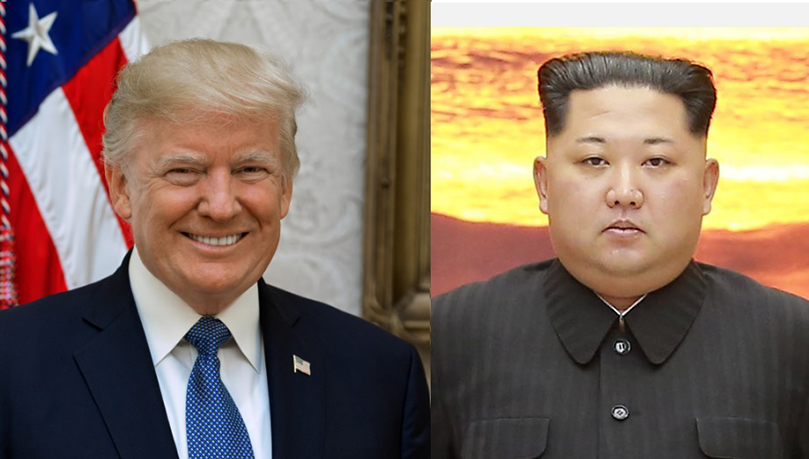
On June 12 Presidents Donald Trump of the United States and Kim Jong un of the Democratic People’s Republic of [North] Korea met in Singapore. Shortly after that, Trump announced the cancellation of planned U.S. South Korea military maneuvers, at least until there is a failure on denuclearization efforts.
Though media in the US are portraying this as a betrayal of South Korea, the South Korean government applauded it. Indeed, it would appear that what made the meeting possible was the initiative of South Korean President Moon Jae-in, acting with strong support from the People’s Republic of China.
People in the United States, for the most part, are unaware of the historical background of these events.
Possible peace in the Koreas did not spring fully formed from Trump’s brain. The two Koreas have been going on and off about normalization and unification for some time now. A lot has depended on who sits in the president’s chair in Seoul, the South Korean capital. The North has, for a long time, stated that it wants peace and reunification.
A long line of right-wing leaders in South Korea, supported by various U.S. administrations, have been major obstacles to a peaceful rapprochement. But within the last 15 years, the logjam has begun to break. South Korean President Roh Tae Woo (2003-2008) had already adopted a “Sunshine policy” of friendship and rapprochement between the two Koreas and was developing it in practice, starting with economic cooperation. This greatly annoyed the George W Bush administration who considered Roh to be an enemy of the United States. Inability to get progress on the peace and reunification effort may have been a factor in Mr. Roh’s suicide in 2009.
The predecessor to the present president, Moon Jae-in, was Mrs. Park Geun-hye. She is the daughter of the military dictator Park Chung-hee who ruled South Korea with a repressive iron hand from 1963 until his assassination in 1979. Like her father before her she was a fanatical enemy of reconciliation and a hard-line rightist. But last year, she was impeached, deposed and imprisoned in a very bizarre corruption scandal. Mr. Moon Jae in won the presidency in response to public disgust over this scandal. Moon had been an official under Roh Tai woo, and decided to return to the Sunshine Policy. He appears to have decided on maneuvering to avoid the fate of Roh who was thwarted by the U.S. attitude. Moon calculated that he had to at least neutralize the United States while relying heavily on Chinese diplomatic support to get Kim on board. Step one was bringing a North Korean delegation to the Winter Olympics in Pyeong Chang in South Korea in February. That “broke the ice” so to speak.
This has now paid off. In spite of the wild “fire and fury” sabre rattling by Trump, there was an initial announcement that Trump and Kim would meet. Then Trump pulled back from it, but Moon stole a march on Trump by setting up a meeting between himself and Kim in Panmunjom on the border between the two Koreas on April 27, a bold move which got lots of positive press coverage. There followed the Singapore meeting.
Reactions to the Singapore meeting have been varied. Some have pointed out that the document that was produced was pretty vague on the specific of when and how there would be denuclearization of North Korea. Others reply that it is not to be expected that N Korea will suddenly announce abandonment of all nuclear weapons development, at least until negotiations are further along. They point out that when Gadaffi of Libya announced the end of his nuclear plans he got killed.
But there are many positive aspects to this development.
- It may indeed be a step in the direction of a final end to the Korean War after 68 years. Most people in the United States don’t know that the Korean War never ended; there was only a truce agreement, not a final peace treaty. This is an important factor to take into account when trying to understand the North’s behavior. During the Korean War, U.S. and allied forces nearly destroyed the country, flattening towns and cities and killing nearly a million civilians. A particularly ugly aspect of the slaughter was the deliberate massacre of fleeing refugees by U.S. and allied troops, information about which was hidden for many years. These things are little remembered in the United States today, but they are raw wounds to Koreans both North and South.
- The prospect of a sharp reduction of tensions on the Korean Peninsula and East Asia .
- Reduction of arms buildups on both sides, with “peace dividends for working people in the United States and both Koreas.
- Renewal of the North-South Sunshine policy, leading to possible eventual reunification.
- Possible end to crippling sanctions that have hurt ordinary people in the North.
- More democratic forces in S. Korea strengthened if Moon pulls this off.
The reaction from the United States was troubling. Some Republicans repudiated the thing, but so did a number of Democrats including high ranking ones and corporate media that are aligned with the Democratic Party. Senators Chris Murphy (D-Connecticut) and Tammy Duckworth (D-Illinois) introduced an amendment to the Defense Appropriations bill which has the evident purpose of blocking possible plans for removing U.S. troops from the Korean Peninsula; the sense of this legislation is that this could not be done without checking with the Defense Department.
Pundits completely ignore the role of the South Korean government in this and also the role of China in making this opening possible, attributing everything to Trump’s and Kim’s evil intentions. Also, they ignore the interests of the ordinary inhabitants of the two Koreas which lie in the direction of peace and disarmament.
Fifteen Democratic members of the House wrote a letter dissenting from these views of other top Democrats. Head of this group is Ro Khanna of California but Barbara Lee, Karen Bass, Raul Grijalva also signed on. In addition, a bipartisan group has introduced legislation in the House of Representatives supporting peaceful negotiations (HR 861). These are constructive developments.
Around the world, communist and left parties express cautious optimism about the possibility that the initial negotiations might eventually produce a peaceful resolution of the long Korean standoff. The Portuguese, Japanese and Canadian communist parties take this attitude, for example.
The rightwing government of Japanese Prime Minister Shinzo Abe is likely to be less well pleased, because it has been using bogey of North Korea’s possible nuclear capacity as a pretext to change the Japanese constitution to give wider scope to overseas military activities. But the hands of those in Japan who oppose a possible return to militarism will be strengthened if the peace initiative prospers.
This may not work out in the long run, but the mere fact that we deplore Trump and his other policies, domestic and foreign, does not mean that we should not support the efforts of the Korean people to achieve a peaceful settlement of this long running dispute.
Image: Wikimedia


 Join Now
Join Now